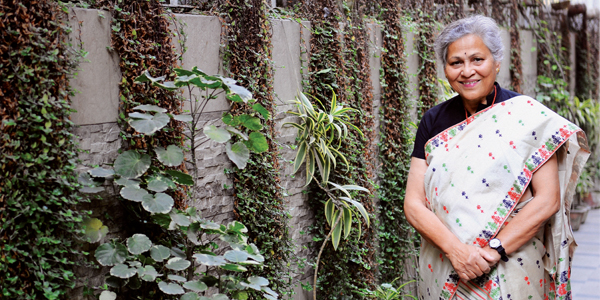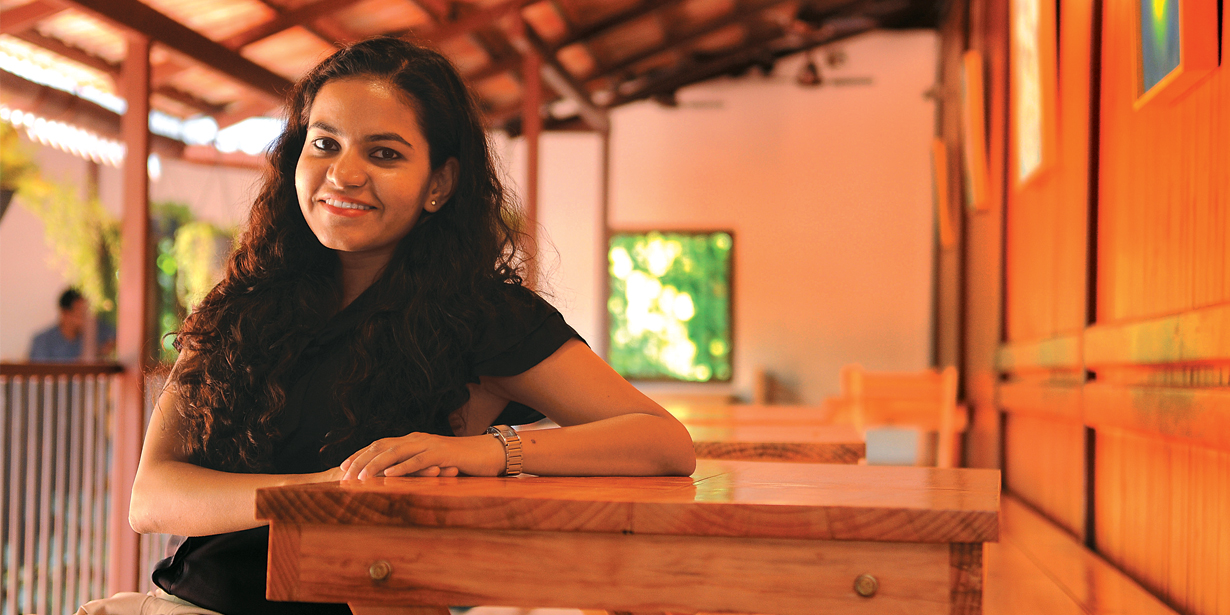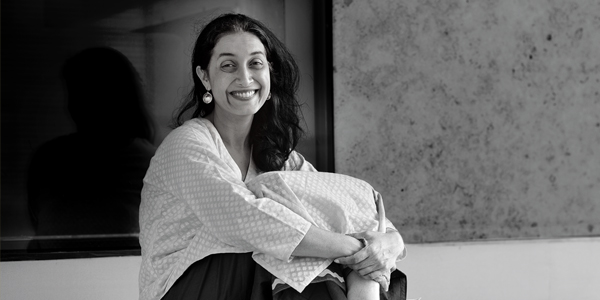Facing an “identity crisis” when she sold her first company to Disney, how Zarina Screwvala found an even stronger purpose with Swades
Swades Foundation’s Zarina Screwvala isn’t one for a predictable path and that’s what makes her the super achiever she is
Walking away from something you love is never easy. And Zarina Screwvala had spent close to three decades nurturing an organisation she started. It was February 2012, when the media veteran and her co-founder husband, Ronnie, had sold UTV Software Communications to The Walt Disney Company. Needless to say it had a profound impact on Screwvala, who struggled to extricate herself from the enterprise. “The only thing holding me back was the fear of letting go — my entire identity was wrapped up in UTV,” she candidly shares.
 A few months later, a tiny piece of paper plastered on the wall at her philosophy class helped her gain a fresh perspective about her scenario. The post displayed a quote by a Chinese legend, Lao Tzu — “When you let go of who you are, you become what you might be”. A fairly small sentence but powerful enough to make her contemplate her next step. A month later, she bid adieu to the media company and in her own words left behind “a kickass” team in charge, that she was confident would outperform her.
A few months later, a tiny piece of paper plastered on the wall at her philosophy class helped her gain a fresh perspective about her scenario. The post displayed a quote by a Chinese legend, Lao Tzu — “When you let go of who you are, you become what you might be”. A fairly small sentence but powerful enough to make her contemplate her next step. A month later, she bid adieu to the media company and in her own words left behind “a kickass” team in charge, that she was confident would outperform her.
Once the painful part was taken care of, Screwvala had attained the clarity to envision her next enterprise. Taking a leaf out of the charitable arm of UTV she set up in 2001, Swades Foundation was established in 2013. Screwvala elucidates how her one-year extensive research, which involved field visits across various NGOs (including the biggies like SEWA and BRAC), gave her a multipronged strategy for Swades. The NGO that has empowered close to 500,000 people so far focuses on health, education, sanitation, community mobilisation and creation of livelihood.
Based out of Mumbai, the foundation managed to reach out to 2,000 villages across six blocks in Raigad in Maharashtra. It has set itself an arduous target of empowering 1 million more in rural India over the next five years. “We are trying to create a model of development that can be replicated by others and scaled,” she explains.
Swades’ design follows three key elements — a 360-degree multifaceted approach as it believes there is no silver bullet to eradicate poverty; second is collaboration and third is defining an exit strategy. Screwvala, who worked with several diverse teams over her long media career applies her lessons from the boardroom, “We believe there is no point doing something by yourself, if you can get someone else to do it better than you. We are clear that we have to bring people’s standard of living to a given threshold and then stop any kind of intervention. Because we are not just aiming to empower a million people, we want to empower many more, which is impossible without a well-defined exit strategy”.
The opportunist
Screwvala didn’t set out to become an entrepreneur, she simply believed in her abilities as she relentlessly followed her passion. After completing her undergraduate degree in Economics from St.Xavier’s College in Mumbai in 1984, she followed it up with an additional course in marketing and advertising at Xavier Institute of Communications (XIC). It was around this time she first met her husband while doing theatre with stage doyenne, Pearl Padamsee. And after a few months she found herself working on the production team of India’s first independent show for Doordarshan titled Mashoor Mahal. This was again produced by ad man Alyquee Padamsee, directed by Ronnie and managed by Deven Khote, who ended up co-founding UTV with the duo.

Not only did the show become a huge success, but it also helped the trio form the genesis for what was launched as UTV in 1990. They continued to do shows for Doordarshan until liberalisation brought in foreign broadcasters. UTV was commissioned to produce 250 hours by Zee TV making the budding enterprise one of the largest content providers in India. Screwvala was responsible for programming across genres and UTV adopted an unconventional approach by introducing game shows, chat shows, daily soaps with strong progressive women characters that set a new precedent in Indian television.
Soon enough in 2000, Zarina and Ronnie were married. When asked how it was to share the workspace with her spouse she admits that it was not easy and also something she would not recommend to other people. “We seem very similar on the outside, high energy and very communicative. We value the same things, but our approach is totally different.” So, for instance, Screwvala says she is more contemplative and action-oriented. “Ronnie will just say how are we doing it, I will ask why we are doing it. I think that is the biggest difference between us. But, if you put us together, we are phenomenal.”
But apart from her personal life, Screwvala didn’t find the daily soap era of the new millennium very exciting. She was increasingly getting uncomfortable with what she was doing. Finally, in 2005, she took a sabbatical for a year, which unfortunately, ended up lasting for only a fortnight. She began her break with a 10-day vipassana program. When she returned, Ronnie offered her the position of head of programming at Hungama, a Hindi kids and entertainment channel. UTV had just turned broadcaster, which meant it could decide which content would make the cut for broadcast. And with few India television channels catering to kids and teenagers, Screwvala decided to get on board. “I absolutely enjoyed the whole experience. I felt like I was more in control.”
Aiming for the stars
Screwvala soon realised that there was a great deal of difference between producing content and broadcasting. Her relentless pursuit towards mastering anything new ensured that Hungama scaled new heights. “I knew nothing about broadcasting, but I studied and went up to everybody I knew to understand what should I watch out for. We were a small channel and nobody’s competitor,” she recalls.
Before she took over the reins at Hungama, it garnered a dismal 23 gross rating points (GRPs), while its major competitor, Cartoon Network clocked a massive 200. Within a year of joining the team, the Indian channel managed to outperform global behemoth’s India offering, Disney. “That was really gratifying,” she describes. Besides, the domestically produced shows like Hero and Saniya, her introduction of international favourites such as Shinchan and Doraemon popularised the channel amongst kids. Hungama’s content ‘spoke their language’.

Thanks to Hungama’s rising popularity, Screwvala was invited to supervise the creation and launch of the leading kids channel in Indonesia and Malaysia called Astro Ceria in May and August, 2006, respectively. She repeated the same drill there, which involved doing extensive research to get a true flavour of their culture. It was no surprise that she had the same degree of success – defeating Disney in those markets. Beating an international media conglomerate like Disney in India, Indonesia and Malaysia continues to be something she is proud of.
Disney eventually acquired Hungama in 2006, for $30.5 million. While that deeply saddened Screwvala, she knew it was the right thing to do given that it was a single kids channel in their portfolio. She didn’t stay idle for long though. Soon the concept for a local Indian youth channel was in the making, which resulted in the launch of UTV Bindass by mid-2007 with Screwvala as the CEO. And thanks to its differentiated content, the new player was rated as the number one youth channel in India by 2010.
Apart from the zealous spirit, it was Screwvala’s dogged determination not to opt for the tried and tested path that helped her stay ahead in an extremely competitive industry. While UTV continued to create differentiated content, Disney began steadily increasing its stake in the company post the Hungama acquisition. It finally culminated in $454 million buyout by Disney in 2012 leading this entrepreneur to her next venture, Swades.
Keep up the pace
With one successful stint after the other, what keeps Screwvala going? She believes it is her enormous sense of passion and purpose. And she points out that is what sets women apart. She strongly believes that only when you have a tough time, do you learn anything. “So everyone goes crazy when things go wrong, but I start waking up then. I get bored when things go right,” says Screwvala, hurriedly clarifying, “I like it, I am not saying I don’t like it, but it’s boring.” She emphasises the secret sauce to success is really about how you deal with challenges. “When life is talking to you, saying I am giving you a challenge, giving you an opportunity to grow, you grab it with both hands. It matters what your attitude towards difficulty and challenges is; you should see them with joy.”
But riding over the wave hasn’t been an easy one. The term work-life balance didn’t apply to her then. She reveals, “In the beginning when UTV was a baby, I used to work all day, even over the weekend. I neglected my family as I wasn’t married then. I regretted it, but now I am making up for it. It’s a tough call, but a choice I made naturally.” She further on elaborates on the need for women to be open to help as they juggle several responsibilities.
“I think women don’t ask for help. I always build that ecosystem where somebody is around when needed. And then you can be a super-woman, seriously. But without it, you can’t,” she cautions. While the world of television and social work maybe on different ends of the spectrum, understanding the aspirations of the end customer is paramount to success in both fields. And given Screwvala’s past record, she clearly knows a thing or two about getting the pulse of her audience right. She acknowledges that Swades is her most challenging assignment to date but is totally geared up and is leaving no stone unturned to ensure her dream of empowering a million comes true.










